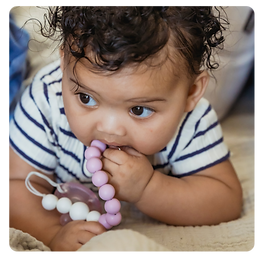All babies are different, but most babies get their first tooth during their first year.
We recommend taking your baby to a dentist by the age of 1. If they haven't had their first tooth by this age then the dentist can have a look.
You know your baby best. If you are worried about any symptoms you can contact your GP, or call NHS 111 for help.
Teething
_edited.png)
When do babies start teething?
-
Most babies get their first tooth around 6 months old.
-
Some babies are born with some teeth.
-
Some start teething before 4 months old.
-
Some start teething after 12 months.
_edited.png)
How do I know if my baby is teething?
Sometimes, baby teeth come in without any pain.
Or you might notice:
-
Sore and red gums where the tooth is coming through.
-
A mild temperature (less than 38°C).
-
One flushed cheek or a rash on their face.
-
They might dribble more than usual.
-
They might chew on things.
-
They may be more upset or not sleeping very well.
_edited.png)
Can I use medicine or painkillers?
Try other methods to help your baby first. We have included some below.
If your baby is still in pain, you may want to try a sugar-free medicine.
-
If your baby is OVER 3 MONTHS OLD: Paracetamol or ibuprofen can be given to help teething pain. in babies and young children. Always follow the instructions that come with the medicine.
-
DO NOT use for babies younger than than 3 months old.
-
Children under 16 years old should not have aspirin.
-
If you are not sure, ask your GP or pharmacist for help.
HOW DO I HELP MY BABY WITH TEETHING?
_edited.png)
1. Teething Rings:
Teething rings are safe for your baby to chew on. They can help distract you baby from teething pain.
-
Some teething rings can put in the fridge. Cool rings can help to soothe your baby's gums.
-
Always follow the instructions that come with the teething ring to know how long to chill it.
-
Do not put a teething ring in the freezer. If it gets frozen, it could hurt your baby's gums.
-
Do not tie a teething ring around your baby's neck. It can be a choking hazard.
_edited.png)
2. Chewing:
When your baby is teething, they might chew on their fingers, toys, or other things they can grab.
Healthy things to chew on:
-
If your baby is 6 months or older, you can give them raw fruits and vegetables to chew on. Soft cold fruits like melon can soothe their gums.
-
You can also give them a crust of bread or a breadstick.
Safety tips:
-
Always watch your baby when they are eating to make sure they don't choke.
-
Avoid foods with lots of sugar (like rusks). Sugar can cause tooth decay, even if your baby only has a few teeth.
3. Teething Gels:
We DO NOT recommend using teething gels. There is not much proof that they work. It's better to try non-medical options first, like a teething ring. Ask a pharmacist for advice before using teething gels.
If you do decide to use a teething gel:
-
Make sure it is made for young children.
-
Do not use general oral pain relief gels for children, it can be dangerous.
-
Teething gels have a mild local anaesthetic and are only available from pharmacies.
Homeopathic Teething Gels:
-
There is no evidence that homeopathic teething gels work.
-
If you do use one, make sure it is ok to use in the UK.
_edited.png)